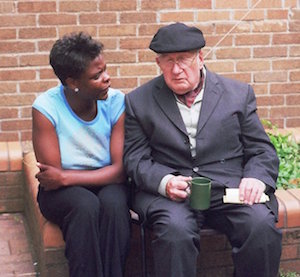
How can you communicate effectively with someone with Alzheimer’s?
It can be challenging when your loved one faces a diagnosis of Alzheimer's disease or dementia. (Dementia is different from Alzheimer's disease but can present similar communication difficulties.) Understanding Alzheimer's disease and the communication issues it presents can help you learn how to communicate better with your loved one making life easier for both of you.
What kind of changes happen in communication skills?
Every person with Alzheimer's disease is unique and so are his or her communication challenges. There may be a variety of changes in communication skills. Understanding Alzheimer's disease and its effect on communication can help you navigate these changes.
-
Repeating familiar words
-
Inventing new words to describe familiar things (e.g. a watch may become a "wrist-clock")
-
Speaking less frequently
-
Difficulty with organizing words in a logical order
-
Speaking a native language
What are some strategies to communicate better with an Alzheimer's patient?
Communicating with someone with Alzheimer's disease requires a great deal of patience compassion and good listening skills. The more advanced the person's disease the more difficult communication becomes for him or her and the more important it is to use strategies to communicate well. Communication includes verbal and non-verbal cues as well. Consider the following tips outlined by the Alzheimer's Foundation of America and the Alzheimer's Association to effectively interact with your loved one:
-
Use visual cues. According to the Alzheimer's Foundation of America pointing to things or demonstrating a task can help the person understand. You can also encourage the person with Alzheimer's to point or gesture if words aren't coming to mind.
-
Approach the person from the front. Surprising someone from behind or touching him or her unexpectedly can be upsetting for someone with Alzheimer's disease.
-
Use simple words and short sentences. The Alzheimer's Association recommends you keep communication as simple as possible.
-
Speak slowly. Speak slowly to give the person time to process what you said.
-
Give time to respond. Likewise because people with Alzheimer's disease may process language more slowly than before wait patiently before saying more allowing them time to respond.
-
Keep your language positive. Instead of "don't do this" say "do this." For example avoid saying "No don't get up from the couch." Use an easy and patient tone and rephrase as"Let's stay here on the couch."
-
Convey a positive and easygoing tone. Be aware of your tone of voice and nonverbal communication cues like facial expressions and mannerisms. Be positive friendly gentle and relaxed.
-
Minimize distractions. Make sure the TV or radio are off and any other distractions are minimized when you are talking with each other.
-
Don't argue. Let it be rather than arguing even if the person is incorrect. Confrontation will only agitate him or her.
-
Be comforting and reassuring. Encourage the person to continue to share his or her thoughts. If he or she is having a difficult time you can validate feelings by providing supportive words like "I can see this situation is making you feel anxious."
With these tips and strategies you can learn to communicate well with someone with Alzheimer's disease. This will provide him or her with the much-needed feeling of being heard and understood helping to improve behavior and overall well-being.


